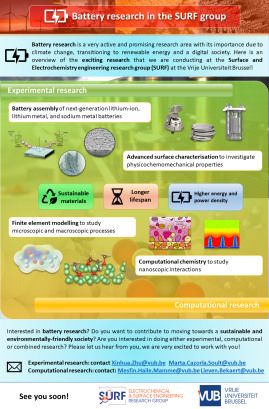battery research
Our latest research focuses on achieving high energy density, power density, a long lifespan, low cost and environmental impact battery materials. With the transition towards the higher energy-density lithium and sodium metal electrodes and fast-charging, high-performance applications, the greater demands from these materials causes new challenges to arise such as unstable electrode-electrolyte interfaces, dendrite growth, and the mechanical stability of electrode and electrolyte materials. To overcome these challenges, at SURF we combine experimental with modelling research to study the phenomena and material properties of battery materials using advanced characterization techniques (Atomic Force Microscopy (AFM), Scanning Electron Microscopy (SEM), X-ray Photo-electron spectroscopy (XPS), Electrochemical Impedance Spectroscopy (EIS), and more) and state-of-the-art multiscale modelling techniques (Finite Element Modelling, Classical Molecular Dynamics, Reactive Force Fields (ReaxFF), Ab-Initio Molecular Dynamics (AIMD) and Density Functional Theory (DFT) in collaboration with the VUB ALGC Quantum Chemistry group. Our focus is on liquid and solid-state lithium- and sodium-ion and metal batteries, covering all aspects from the electrodes, electrolyte, interfaces and cell cycling, and also the study of capacitors, focusing on the interaction between materials to achieve devices with higher energy densities. Both approaches aim towards a future of greener and efficient energy storage and use.

